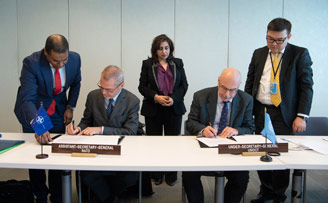NATO and United Nations working together to strengthen Jordan’s security and defence capacity against terrorist threats
NATO and the United Nations have launched a partnership to strengthen Jordan’s resilience and capacity to deal with threats posed by terrorist attacks with the use of weapons of mass destruction. On 5 March 2019 - at the UN Headquarters in New York - representatives of NATO and the United Nations Office of Counter-Terrorism (UNOCT) signed a Memorandum of Understanding on the implementation of the joint Project on “Enhancing Capabilities to prepare for and respond to a terrorist attack in Jordan featuring the use of Chemical, Biological, Radiological, and Nuclear (CBRN) weapons.”

“This is an important occasion, which brings together the UN, NATO and Jordan, as a valuable partner for both organisations, in this unique project,” Dr. Antonio Missiroli, Assistant Secretary General for NATO’s Emerging Security Challenges said during the signing ceremony. “This joint UN-NATO Project represents a milestone for the NATO-Jordan Defence Capacity Building Package, and in the strategic partnership between the UN and NATO. We are looking forward to seeing our joint efforts come to fruition over the next three years, as Jordan enhances its national resilience and preparedness to deal with different kinds of threats,” he added.

“The possibility of non-state actors, including terrorists, acquiring lethal technologies and weapons is a challenge for international peace and security. My Office is committed to help Members States build and strengthen their capabilities with respect to this serious threat,” Under-Secretary-General Vladimir Ivanovich Voronkov, Head of the UNOCT and Executive Director of the United Nations Counter- Terrorism Centre (UNCCT) pointed out. “This MoU represents the strong commitment of the United Nations and NATO to working with the government of Jordan,” he added.
“This trilateral project sets a good example of cooperation between States and International and Regional Organizations, and it also reflects the urgency to raise the level of preparedness and response for the worst possible terrorist attacks whether it’s a Chemical, Biological, Radiological or Nuclear,” H.E. Ms. Sima Bahous, Permanent Representative of Jordan to the United Nations said.
This UN-NATO Project will build on the existing NATO project with Jordan to enhance its national crisis management capabilities within the National Centre for Security and Crisis Management, which was launched in February 2018, with contributions from four Allies, through the NATO Defence Capacity Building Trust Fund. It will feature the development of a national crisis plan for dealing with threats posed by Chemical, Biological, Radiological and Nuclear weapons and the conduct of a field exercise with a virtual reality component.
